TRANSCRIPT:
(This transcript is derived from an automated process. The video recording is authoritative.)
Okay. Thanks very much, Jewel. I'm just gonna wind up talking about the, my game is politics. I've spent most of my life working for politicians. Don't hold that against me. Um, and sometimes it's been fun, sometimes not.
But I just talk about the policy and political implications of this whole thing we've been talking about. And while the Voice was certainly defeated, it wasn't the biggest loss we've had.
There's been bigger losses to referenda in the past. I'll just put a couple up here. You may not remember the incomes power, power back in, uh, 1973, it only got 34% Yes vote.
Parliamentary terms only got 32%. Um, yes, vote, uh, rights and freedoms only got 30% vote. These are all put up by the ALP. The Republic only got 40, uh, 5%. Uh, yes.
And the Voice only got 39. So certainly pretty poor. And only, and only 11 referendum have been lost in all states. And the Voice, the Voice is one of them.
So to me, it's a still a pretty significant, significant event we've had. And there's some very special features about the Voice referendum, and I got very annoyed. I, I know we viewed it about different corporations and bodies that endorse, endorse the Voice or send emails around to their staff to say, do the right thing and do the Voice.
And so on this, because my point all the time, this was a political act, okay? The, the Voice did not have like, some referend in the past, like the 1967 won bipartisan support.
So corporations in Australia, certain other groups in Australia were engaging in politics. And politics should be kept out of the workplace in that situation. And also, I think Kevin's touched on the actual formal committee that they had set up to give advice on the Voice.
And, and, and the, the wording, they didn't even follow it. It wasn't the, the, the correct wording anyway. But what was really, what really upset me was this corporation support around Australia that we saw, uh, airlines giving free tickets if you're in the Yes camp.
Okay? Um, and I know on the Monday afterwards, uh, the place where my son worked, which I cannot mention, uh, an email went around, those who are suffering, uh, can get time off and so on and so forth.
Now, uh, a couple of staff at that organization sent an email back to the great powers that be, that, Hey, we think this did a lot of harm to business, and by the way, we really don't think you should have been doing it.
And of course, I said to my son, you, maybe you should send, uh, if you want to not keep your job for very long, uh, maybe you should send an email saying if you voted no and it lost, would you get time off as well?
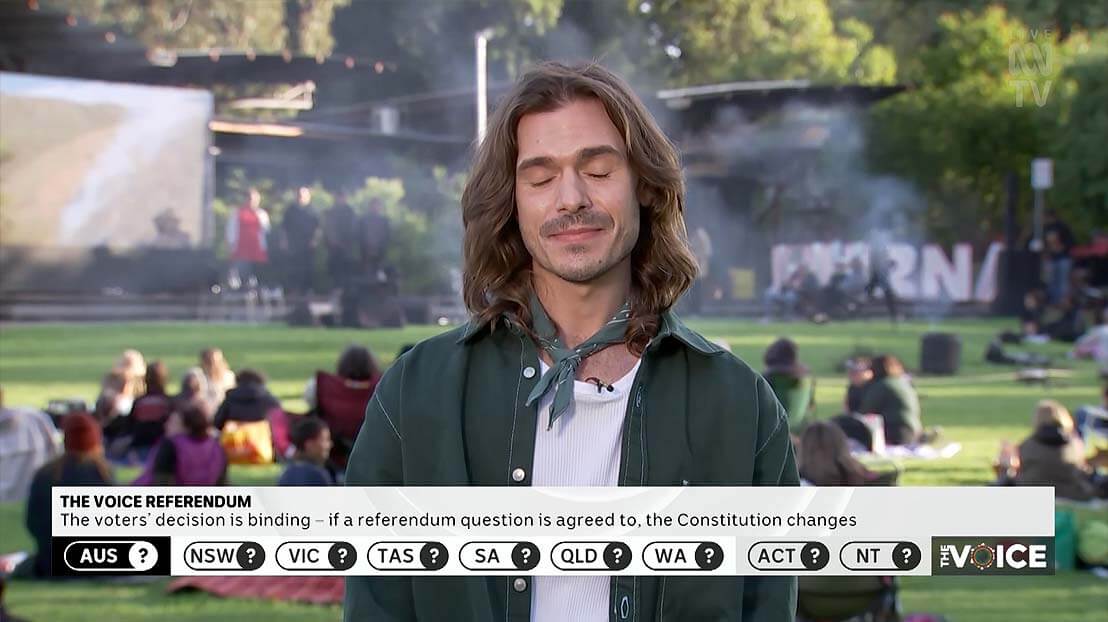
You know? Right. That's the question I find interesting. I also thought that the celebrity endorsement was nauseating me. Oh, why? I don't want, uh, a sportsman telling me how to vote.
Alright? Okay. I don't follow sports. I don't really want someone who plays some game called rugby or something telling me how, how to vote and, and or Johnny Farnham telling me how to vote.
Okay? Or, uh, someone, someone who's drawing someone speak up to Johnny Farnham. The poor guy was on his deathbed and he was broke. That's why they sold the most, well, I don't think he really supported It. He supported it. Um, and, um, and all the culture, the culture, vulture Vultures supported it.
Uh, also, the other thing which was very hard about this referendum was the personal attacks.
Now, the personal attacks, that, that's why you never saw many No signs around the place, right? You had lots of Yes signs, um, and the personal attacks, which I've never seen in a, we have disagreements now, society, that's fine.
I think that's a bad idea. That's a stupid idea that we could do something better. But it became a personal attack that you were somehow a second rate person if you had said no, or you are being irrational.
Now, the great saving grace of this was of course Jacinta Price, right? It's, it is pretty hard to call just enterprise of race. And if you saw her on the National Press Club, wow, that was just did it, didn't it?
You know, 35 minute speech answered every question. Put the comp compare person in his place a couple of times, and fantastic. Then we had all the advertising going on, uh, that all, all these things are gonna have some lessons for future election campaigning.
Uh, all the, all the advertisements, you know, there was hardly much on the, on the No side. Um, and, um, then we had the emotional, I think Kevin is right.
We actually didn't see those words of what were in the referendum proposal talked about. Unless you read your little booklet or something, you know, if you should do the right thing by voting this particular way.
Now that's, that's a legitimate point of view, I accept. But we, we sort of don't, when we go to election time, we don't say 'we better vote Labor or Liberal and do the right thing and feel sorry for people'.
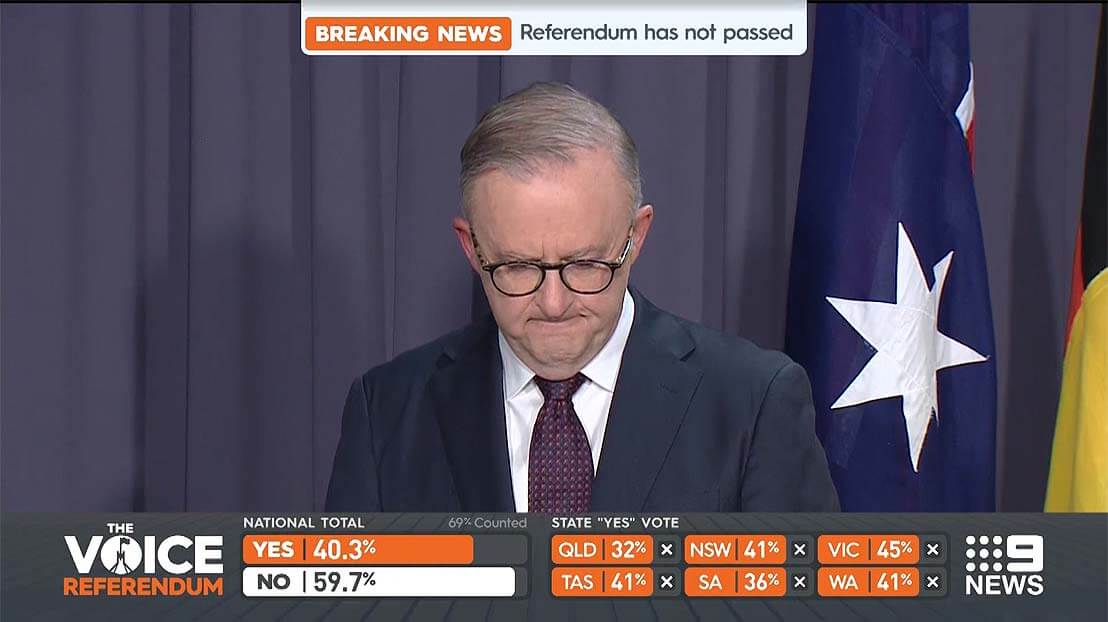
And I think the other thing which marked the Voice was the arrogance of the people who thought this was gonna be a walk-in. Now, to be very, to be very frank, I think the Albanese government appointed went ahead with the Voice for a couple of political reasons.
It wasn't about addressing thing one, it was to keep the Greens at bay 'cause the ALP is being nibbled by the Greens, right? Okay. So some seats that changed in Queensland, they went to the Greens, not to the ALP.
The second thing they thought were being very smart, they got Mr. Dutton, the leader of the, um, coalition. And this will divide the Liberal party, right? All those progressives in the Liberal party.
So this was a political technique to wedge the Liberal party and hope it will divide them now for a whole range of reasons that didn't happen. So, but I believe it was highly politically, don't, don't think this did not have a political partisan agenda.
It did have. So let's go forward. So what are some lessons? I think firstly, this is why I think it's important politically, it shows the Albanese government, uh, is not, is not, um, always on the winner.
That it's, that it can make mistakes. There's something went really wrong inside the government that went ahead with this referenda and did it so badly. It really shows that the government that's had a pretty dream run is quite vulnerable. It can be beaten in a sense. That's a very important thing.
Secondly, politically, it's important that the Liberal party, uh, spurned on a bit by the National Party, we have to accept, actually had the guts to take a stand, right? Because I have a view that you win elections, not not being like the other mob, but being different. Okay? That's how you win. You differentiate yourself from the other mob.
You don't go along the, the best thing a government wants. Let me tell you, I've worked in government. The best thing a government wants is for the opposition to agree with you. Right? It means you got haven't gotta work very hard, easy.
Um, the other thing that's brought out that we often use this term in politics, the silent majority, okay? The people who are not joiners don't want to march in the streets, don't want to attack someone, but they're the silent majority, I think, to show that there is such a thing as the silent majority.
And they spoke and we heard them, and the government has gotta listen to the silent majority. So that's some, a couple of things. Electioneering. Uh, and I've been involved in lots of election campaigns, unfortunately.
Um, so one thing that shows lots of advertising doesn't work. Now, I've always argued that it's, it's basically a waste of time. And we saw, despite all the blanket advertising of the, it didn't work, okay?
So parties, they please stop wasting money on silly advertisements and maybe a bit more money on developing some decent policies for the rest of us. Okay? The second thing, celebrity endorsement doesn't work, right?
Or having celebrity candidates don't, doesn't work too well, that didn't, that didn't sway many voters. Somehow we all sort. So political parties, please select people in the future that have some commitment to your calls and some willingness to fight the fight. And not just because, um, they've run around a football oval or something like that. The other little thing, or anyone who stood out and hand out how to vote cards on election day.
This is, this is a very Australian thing we do, by the way, other countries don't do this, you know, 10 hours out in the sun, great fun, um, giving people how to vote cards, which say put in the rubbish bin as they walk in.
Uh, it's all great. Now, now there's the different polling booths. Um, I was involved in, uh, my church, uh, was a polling booth. We made quite a bit of money from selling, uh, sausage, uh, sizzle things and so on. So that was good. But the, there were about 25 'Yes', people handing out how to vote cards. And three, poor, very tired, 'No' people handing out how to vote cards.
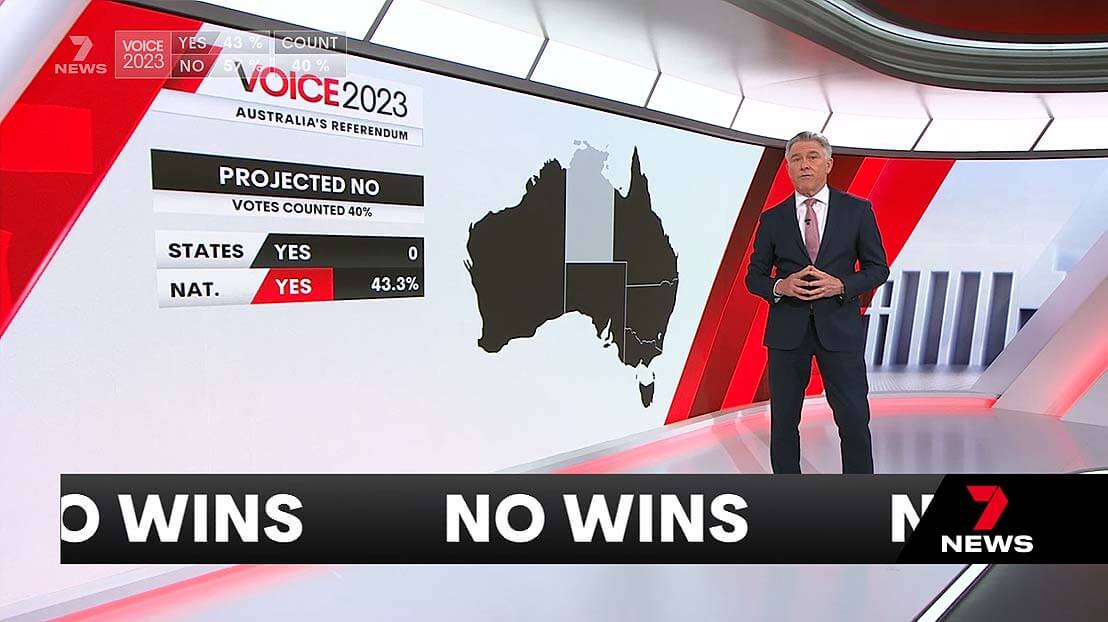
And with, with, you know, there's all these techniques you get told about how you out, you know, no wink. When your people come in, get some friends, you know, Hey, you're going friend all, well, what that proved, it didn't make a difference.
That is all, a lot of political hogwash. Okay? Okay. It's just a lot of hogwash. Okay? Uh, Don Cameron, former members here, he might have a different view. So electioneering, I think we should pick up some lessons about campaigning and elections, uh, about from the, from the whole campaign.
And maybe political parties might maybe spend their money and their time a little bit differently. Um, constitutionally, Kevin hadn't quite mentioned this. It, it does mean, uh, um, Mr. Menzies, our greatest prime minister had one referendum in 1951 with the anti-Communist referendum, okay? Which he'd lost. And I'm told from his daughter that he went home that night, punched the pillow, bugger the lot, and he said, and went to sleep except good, good sleep.
And we never had another referendum under Menzies, right? That was it. That was it. As soon as he left, they had a referendum in '67. So a lesson, the lesson was Mr. Menzies lesson.
He only won seven elections, by the way. So what would he know? He realized that this was really not a good thing to do. Now, one result of all this is it's gonna put a Kibosh on too many people in government rushing ahead with another bright idea about having another referendum on the Republic, okay?
Uh, or something like that, right? Uh, so I think that's it. It's gonna, so that means they'll do other things, of course, that they won't have a reference, but I think it's a really important thing.
So the Republic Committee, uh, based in Canberra, I'm sure they're working out. What's the next step going going to be? Um, now I just wanna look about some trends happening in our political area at the moment. Okay?
Firstly, there's an attempt to portray Australian society as racist. Now, I reject that completely. I'm not saying some people have not had, uh, a hard time at different times from different countries.
Secondly, there's a hostility to the resources sector in Australia. Uh, and the current climate policy mining is bad, okay? That even though coal's our biggest export, right? That's, that's a problem. There's, there's a bit of antipathy towards Christian religion, okay?
I'm not saying everyone went to church in the past and we're all goody two shoes, but it has become quite, uh, quite observable. There's been, as Kevin was saying, a transference of power from parliaments to courts. And we've got more courts now than we used to have. This is another worrying trend. Okay? Next thing.
Um, there's, there's people believe we should open the borders. Anyone should come in, okay? From any country, no matter what's going on, and whether it's got any responsibility to do with us at all, that sort of scenario. And we can see the consequences of that.
You know, what worries me most about all the protest about Israel? So I can't get out how many Palestinian flags there are. I pretty wonders that, okay, how many, where do they all get 'em from?
I don't know. Um, and there's also suspicion of activities of law enforcement bodies and the police are always under the gun for doing something or not doing something. Um, and the other thing I worry about a lot, uh, was signing up to international agreements.
Now, now, Mr. Whitlam, uh, and I've done an excellent book on Mr. Whitlam, which, uh, Anthony will sell you. I, I, I went to a conference years ago. Mr. Whitlam was very big on signing up international agreements.
Now, I couldn't quite ever get as a student, uh, all time since. If you really believe in Australian nationalism, and I'm in the Australian nationalist camp, if you like, you're proud to be Australian. Um, like, uh, Sean was telling us before, um, once you, why do you wanna give up your sovereignty? To sign up to someone else to tell you what to do, especially some of those people telling you what to do aren't particularly nice people.
And so it really worries me that we rush too often into signing into international grim. So these are some of the trends I think that come out that we need to be fighting on these issues just as much as we fought on the Voice, uh, from my view.
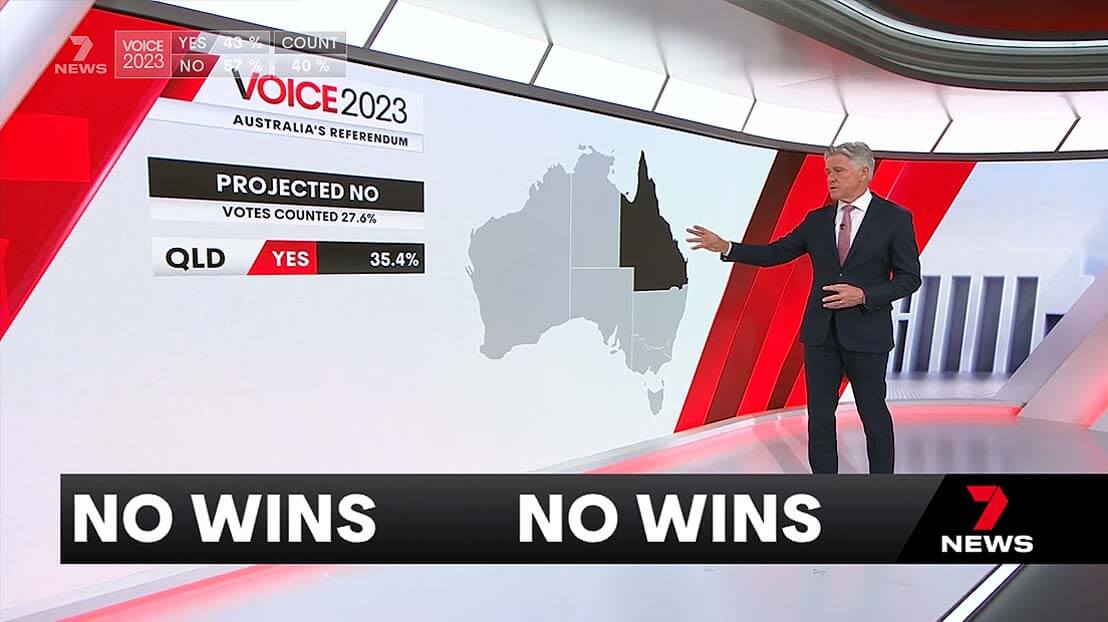
So what's gonna be some future reactions? I think firstly, I think you're seeing it right now. Okay, let's downgrade the no Voice. Okay? It's an aberration. Um, people were racist.
Uh, let's have next thing we'll be having a Sorry day for the loss of the referendum, okay? Right now, I was in, I was in Canberra last week, um, cam Canberra land, I call it lived like Santa Land.
Um, and I went to ANU, beautiful four story building, air-conditioned. Uh, only found two offices open. Um, and I was at a little conference and we got talking over morning tea about the referendum.
And, uh, I said to this, uh, other lecturer, what do you think? He said, oh, well, Scott, you know, it's, it's explainable. I said, well, what's, what's explainable? He said, it's all those uneducated people I see.
I said, well, I said, well, I'm sorry Will, but I, I voted no. He said, you didn't. I said, I did. Shocking. And he said, oh, well, look, it's those poor socioeconomic people. They, they don't understand. I said, well, I said a guy, I happen to know a lot of people who aren't necessarily poor or socioeconomic and anyway, so what if they are, uh, they've still got a right to have viewpoint.
Um, so then at the meeting, uh, I dared to raise the issue. The Voice came up, uh, and, and someone said that they were surprised how high the no vote was in Canberra. You know, it's 40% or something, you know. Um, and they're a bit shocked that there could be so many people in Canberra who voted no. Yeah. Uh, but we did get agreement from someone at the, at the meeting who said, I think I said, there are some legitimate reasons to vote no.
Now, this did not go down very well at the meeting, but I did get some support from someone. And I said, I'm, I'm willing to engage in the argument if you want to have an argument. So that's one thing. We've gotta fight that all the time.
Secondly, I think there'll be some attempt to establish a new Aboriginal Torres Strait Islander Commission or body like we had once before that got closed down because it's corrupt, uh, and so on.
So I imagine it'd be something being set up to, to look for that, that space. Um, thirdly, we'll continue to politicize our public service. Our public services, uh, unlike in Kevin's time or my time, uh, have become increasingly politicized with yes, people and cronies who do the bidding of the government.
That's why we keep making mistakes, by the way. That's why things keep, uh, producing things that are not very effective. So I think this is another way. So we'll politicize key bodies with, um, uh, people with who will do the right thing in that sense.
Okay? Um, there'll be, um, uh, um, hectoring across institutions. So, so some institutions who don't want to, uh, play ball will get, uh, pilled a bit and so on. You also see there's a report come out.
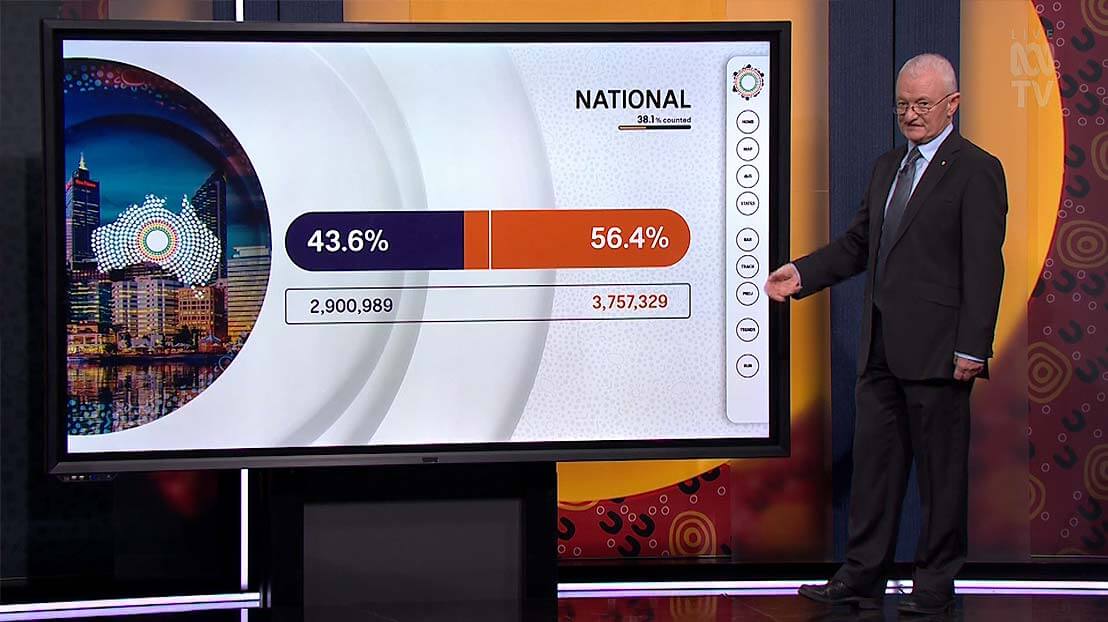
There's a, believe it or not, there's a crazy idea. They wanna increase the size of, have more politicians. Now, I think this is a crazy idea, okay? Um, I love politicians, but we've got enough of them.
Thank you very much. Now, just think in Queensland, there are three state politicians to every federal member of the House of Refugees. Think about it. State parliament sits 40 days a year.
Great job if you can get it. Uh, and um, now there's a proposal to increase the number of senators to 14 for around the states, 14 for Tasmania, 14 for Queensland. Also to increase the number of senators in the territories from two to four to now. This will mean that you'll create more possibilities for Greens to get elected and so on.
Things like, so very danger, danger. So be careful of those events. So this referendum has really important implications to politics. It determined will determine how the non-Labor side of politics wanna run with this.
Do they wanna run with the tour, take the initiative of it? Or do they wanna just lie back and let the other mob as usual set the agenda? That's the problem. Okay. What's been going on?
So let me just finish up. Was it a victory for the silent majority? It sure was. Uh, and that's the way it should be. It's all right to, I wrote an article saying, it's all right for Liberal s to say no, right?
All right. To say you don't agree with something. 'cause that's the basis of democracy. That's the basis of why we have a vote, why we have a referendum. And if we don't have that right and we get belittled for it, we are finished.
And I just wanna put up a couple of things you should read, um, one book here called The Political Brain. It's the book if you wanna read about campaigning. It's the book you should read, okay? Uh, you can buy it.
There's a great book here, uh, from Con Court about Divided Australia, which is over there for sale. Uh, it's a really good book about the fragmentation. The thing that Kevin talked about we're fragmenting our society rather than bringing our society together.
Uh, and there's another book by Lin Tanner, who's a Labor former Labor politician, said politics has just become a form of entertainment, okay? She's a form of entertainment. We're full of stunts, politicians doing stunts.
Uh, I think the Olympic Games is one of those big stunts. So on that point, I'm gonna finish and we open up for Q and A.






